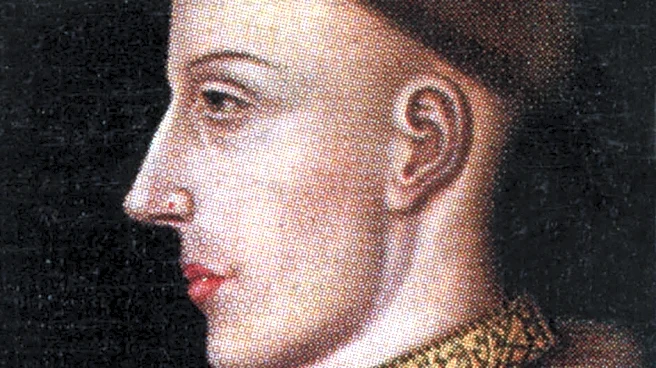Henry V became king of England when he was 26 years old. A relatively young king, his coronation took place in a terrible early spring snowstorm. The English people were unsure whether the unseasonably heavy snow was a good or bad omen, and he was widely viewed as young and untested. In the Shakespeare play that cemented his legend, creatively titled Henry V, the Dauphin of France insults the young king Henry by sending him a gift of tennis balls, implying that he’s still interested in children’s
games.
Despite the uncertainty about his ability to lead the nation, Henry would eventually become the last great warrior king of England. The English crown claimed the French throne based on some ancient and complicated genealogy, and Henry began his reign by reviving this claim. His insistence that he was the rightful king of France reinvigorated hostilities in the Hundred Years’ War, a conflict between England and France that simmered for more than a century and routinely boiled over into full-on combat.
In 1415, Henry invaded France and laid siege to the fortress at the port city of Harfleur. After securing Harfleur, he marched — against the advice of his counselors — toward Calais, a city held by the English to meet with the forces there. Unfortunately for Henry and his army, the French army intercepted them before they could reach Calais near a small village called Agincourt. Unfortunately for the French, though, Henry was prepared.
Though it may be hard to believe, the medieval French army was the most professionalized, fearsome fighting force in all of Europe. Worse, they outnumbered the English forces at least 1.5-to-1 and maybe as many as 3-to-1, including both infantry and their technologically superior cavalry. The odds were extremely poor for the English.
Henry knew that he was both outnumbered and outgunned. To win the battle, he would have to dictate the terms of the engagement. Though the French had superior numbers, the English did have one decided advantage: the longbow. The English longbow was the deadliest weapon of the Middle Ages, and English archers were the world’s best. Defeating the French would rest on the ability of Henry to maximize the potential of his archers.
Upon his arrival in France, Henry had ordered his men to cut down as many small trees as they could and sharpen them to points. He then set these up as palisades around the archers to defend their positions. He also benefited from a stroke of luck as the weather ahead of the battle was rainy, turning the field into something of a mudpit.
As the battle began, the French cavalry charged the English archers, hoping to eliminate the enemy’s strongest asset first. They were charging downhill, which should have given them an advantage, but the combination of the mud and the palisades meant they were entrapped. Stuck and unable to retreat, the English bowmen annihilated the cavalry, and the battle quickly turned into a rout. Estimates of the numbers in medieval warfare are hard to trust, but the French likely lost 6,000 men to 600 for the English. Those losses included the so-called “flower of French chivalry,” most of the most experienced and seasoned leaders in the French army. Agincourt was the high-water mark of the English effort in the Hundred Years’ War and remains among the nation’s most celebrated military victories.
Now, as the 2025 edition of the Georgia Bulldogs prepares to take the field, young Gunner Stockton finds himself in a Henry-ish spot. Despite the valuable postseason reps he got at the end of last year, he remains one of the biggest question marks for the team. And just as Henry’s did, Stockton’s success rests largely on his ability to dictate the terms of the game and to force our enemies to make the mistakes we want them to make. If this year’s Bulldogs are to fulfill the team’s ambitions, Stockton will have to exceed expectations, much like Henry did.
Although, of course, Stockton isn’t going through this alone. Football is a team sport. But he is the leader. As I mentioned at the beginning of this article, Henry V’s legacy is due largely to the Shakespeare plays that tell his story, collectively called The Henriad by scholars. In the play that bears his name, Henry V has two of the most well-known speeches in all of Shakespeare. One, called the St. Crispin’s Day speech, finds Henry addressing his men as “We few, we happy few, we band of brothers,” solidifying their bond as he tells them that their deeds on the field of battle will echo into eternity in the minds of their countrymen.
Whatever happens this season, whether we win it all or end up in Shreveport, I intend to spend every second of it cheering on this band of brothers as they represent the university that means more to me than almost any other place in the world. From the sweltering heat of an Athens August afternoon to, hopefully, the slightly balmy heat of a Miami January night, we few, we happy few, get to root for one of the most exciting football teams in sports.
(Okay, I won’t be that happy if anybody has to go to Shreveport. Have you ever been there? Yech).
The other famous oration, the St. George speech, comes earlier in the play. As the English are attacking Harfleur, the French forces beat them back, and defeat seems imminent. To rally his men, Henry gives a rousing speech to inspire them to victory.
“Once more unto the breach, dear friends, once more!” he begins, eventually ending his remarks with another famous line:
I see you stand like greyhounds in the slips,
Straining upon the start. The game’s afoot:
Follow your spirit, and upon this charge
Cry “God for Harry, England, and Saint George!”
This Saturday, the game’s afoot. Cry God for Kirby, Georgia, and the Dawgs!


















